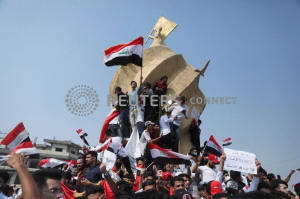Students defy prime minister to join Iraq protests
 Send a link to a friend
Send a link to a friend
 [October 28, 2019]
BAGHDAD (Reuters) - Iraqi security
forces on Monday fired tear gas at school and university students who
defied a warning from the prime minister and joined anti-government
protests that have left more than 200 people dead over the past month. [October 28, 2019]
BAGHDAD (Reuters) - Iraqi security
forces on Monday fired tear gas at school and university students who
defied a warning from the prime minister and joined anti-government
protests that have left more than 200 people dead over the past month.
A spokesman for Prime Minister Adel Abdul Mahdi, whose position is
increasingly precarious as he faces the largest challenge since he came
to power a year ago, said on Sunday that anyone disrupting work or
school days would be severely punished.
Mass street protests in Baghdad and other cities in the southern Shi'te
heartland against economic hardship began at the start of the month and
resumed on Friday after a pause of about two weeks.
Thousands of Iraqi protesters had gathered in Baghdad's central Tahrir
Square on Sunday, defying a bloody crackdown that had killed scores over
the previous two days, and an overnight raid by security forces seeking
to disperse them.

Protesters feared a repeat on Sunday night but no raid came, only the
occasional tear gas canister. After a weekend in which at least 74
people were killed, a reprieve from violence came when no deaths were
recorded in Baghdad or elsewhere overnight. About 231 people have been
overall killed in October.
Videos on social media showed security forces on Monday launching tear
gas at students in one Baghdad district as the protests spread to other
pockets of the capital. One video showed a group of schoolgirls running
and screaming. Students in five other provinces, mostly in the south,
also joined protests.
[to top of second column]
|

Universities students hold the Iraqi flag as they take part in a
protest over corruption, lack of jobs, and poor services, in Kerbala,
Iraq October 28, 2019. REUTERS/Abdullah Dhiaa al-Deeen

"We have come out today to demand our rights which have been taken
away since 2003 when the American government handed us over to a
bunch of thieves," said Abbas al-Hamzawi, an archaeology student in
the southern city of Diwaniya.
"We are here today for freedom, dignity, and a good life. We demand
the fall of the regime, the suspension of the constitution, and an
emergency government," he said.
Despite the OPEC member country's vast oil wealth, many Iraqis live
in poverty or have limited access to clean water, electricity, basic
healthcare and education. Iraq is struggling to recover from years
of conflict following the U.S.-led invasion in 2003 that overthrew
Saddam Hussein.
Iraqis blame a political elite they say is subservient to one or
other of Iraq's two main allies, the United States and Iran. Many
suspect these powers use Iraq as a proxy to pursue their struggle
for regional influence, without concern for the needs of ordinary
people.
(Reporting by Ahmed Aboulenein; Additional reporting by a Reuters
correspondent in Diwaniya; Editing by Giles Elgood)
[© 2019 Thomson Reuters. All rights
reserved.]
Copyright 2019 Reuters. All rights reserved. This material may not be published,
broadcast, rewritten or redistributed.
Thompson Reuters is solely responsible for this content. |